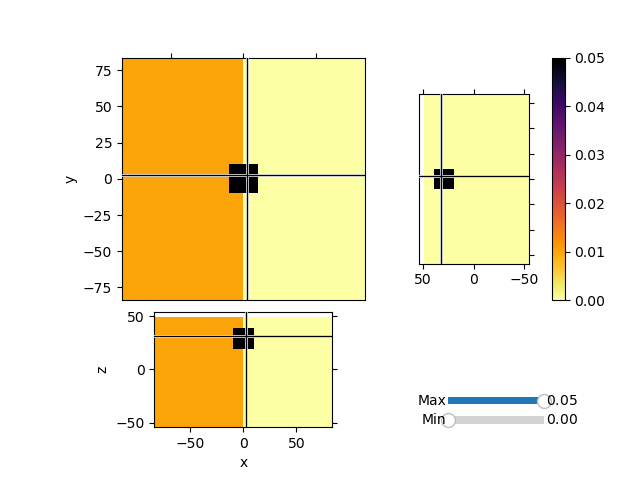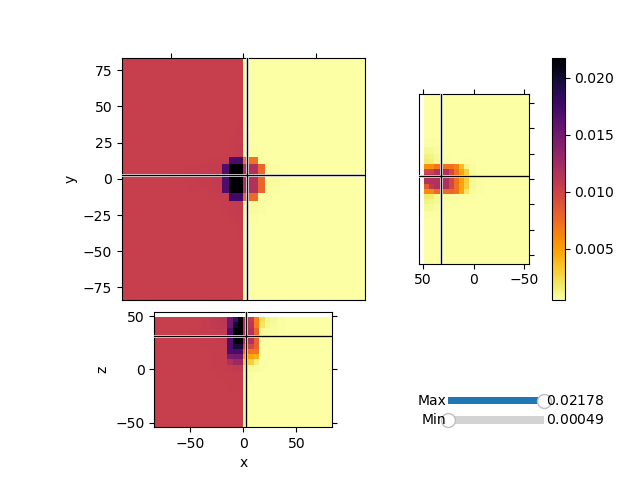Note
Go to the end to download the full example code.
Maps: ComboMaps#
Invert synthetic magnetic data with variable background values and a single block anomaly buried at depth. We will use the Sum Map to invert for both the background values and an heterogeneous susceptibiilty model.
1
Running inversion with SimPEG v0.25.1.dev9+g471344c9a
================================================= Projected GNCG =================================================
# beta phi_d phi_m f |proj(x-g)-x| LS iter_CG CG |Ax-b|/|b| CG |Ax-b| Comment
-----------------------------------------------------------------------------------------------------------------
0 5.70e+05 9.11e+06 4.27e-04 9.11e+06 0 inf inf
1 5.70e+05 1.34e+05 7.47e-02 1.76e+05 6.29e+01 0 3 8.00e-04 1.10e+06
2 2.85e+05 4.60e+04 2.33e-01 1.12e+05 3.51e+01 0 9 6.28e-04 2.74e+04
3 1.43e+05 1.96e+04 3.62e-01 7.13e+04 4.92e+01 0 10 3.38e-03 4.99e+03
4 7.13e+04 6.31e+03 4.76e-01 4.02e+04 5.50e+01 0 9 5.63e-04 5.70e+03
5 3.57e+04 4.51e+03 5.10e-01 2.27e+04 4.80e+01 1 10 8.92e-03 4.54e+03
6 1.78e+04 8.71e+02 6.01e-01 1.16e+04 3.55e+01 0 10 5.17e-04 5.21e+03
7 8.91e+03 8.59e+02 6.02e-01 6.22e+03 4.85e+01 4 10 1.50e-01 2.27e+04
8 4.46e+03 3.81e+02 6.46e-01 3.26e+03 5.26e+01 0 10 9.62e-02 1.04e+05
Reached starting chifact with l2-norm regularization: Start IRLS steps...
irls_threshold 0.010274789283064783
irls_threshold 0.011888237291441433
9 4.46e+03 4.01e+02 8.55e-01 4.21e+03 2.89e+01 3 10 4.72e-02 1.47e+04
10 4.46e+03 4.86e+02 8.91e-01 4.46e+03 3.54e+01 1 10 1.48e-02 2.54e+04
11 3.50e+03 4.86e+02 9.56e-01 3.84e+03 6.14e+01 10 10 5.04e-03 1.73e+04
12 2.76e+03 4.83e+02 9.61e-01 3.13e+03 6.14e+01 3 10 2.90e-02 1.00e+05
13 2.18e+03 4.00e+02 9.76e-01 2.52e+03 3.12e+01 0 10 6.18e-01 2.14e+05
14 2.18e+03 4.14e+02 1.01e+00 2.60e+03 3.06e+01 1 10 3.43e-02 1.34e+04
15 2.18e+03 4.52e+02 9.83e-01 2.59e+03 5.92e+01 0 10 1.23e-02 1.25e+04
16 1.78e+03 4.43e+02 9.80e-01 2.19e+03 6.12e+01 2 10 1.17e-02 2.59e+04
17 1.47e+03 4.63e+02 9.26e-01 1.82e+03 3.43e+01 1 10 1.14e-02 1.33e+04
18 1.19e+03 4.49e+02 8.77e-01 1.49e+03 3.58e+01 1 10 4.79e-03 1.03e+04
19 9.74e+02 3.98e+02 8.26e-01 1.20e+03 6.13e+01 0 10 7.68e-03 1.89e+04
20 9.74e+02 4.03e+02 8.09e-01 1.19e+03 6.06e+01 2 10 1.21e-02 1.36e+04
21 9.74e+02 4.10e+02 7.22e-01 1.11e+03 3.49e+01 0 10 2.58e-02 2.39e+04
22 9.74e+02 4.17e+02 6.77e-01 1.08e+03 3.58e+01 2 10 2.86e-02 1.32e+04
23 9.74e+02 4.21e+02 5.89e-01 9.95e+02 6.03e+01 0 10 1.49e-02 1.47e+04
24 9.74e+02 4.27e+02 5.38e-01 9.51e+02 3.12e+01 2 10 1.04e-01 1.37e+04
25 9.74e+02 4.26e+02 4.68e-01 8.81e+02 3.55e+01 0 10 1.65e-02 1.46e+04
26 9.74e+02 4.37e+02 4.05e-01 8.31e+02 5.77e+01 0 10 4.38e-02 1.31e+04
27 9.74e+02 4.26e+02 3.53e-01 7.70e+02 6.18e+01 0 10 9.35e-03 1.26e+04
28 9.74e+02 4.13e+02 3.02e-01 7.07e+02 3.66e+01 0 10 1.10e-02 1.22e+04
Reach maximum number of IRLS cycles: 20
------------------------- STOP! -------------------------
1 : |fc-fOld| = 1.9145e+01 <= tolF*(1+|f0|) = 9.1132e+05
1 : |xc-x_last| = 3.7582e-03 <= tolX*(1+|x0|) = 1.0075e-01
0 : |proj(x-g)-x| = 3.6605e+01 <= tolG = 1.0000e-03
0 : |proj(x-g)-x| = 3.6605e+01 <= 1e3*eps = 1.0000e-03
0 : maxIter = 100 <= iter = 28
------------------------- DONE! -------------------------
from discretize import TensorMesh
from discretize.utils import active_from_xyz
from simpeg import (
utils,
maps,
regularization,
data_misfit,
optimization,
inverse_problem,
directives,
inversion,
)
from simpeg.potential_fields import magnetics
import numpy as np
import matplotlib.pyplot as plt
def run(plotIt=True):
h0_amplitude, h0_inclination, h0_declination = (50000.0, 90.0, 0.0)
# Create a mesh
dx = 5.0
hxind = [(dx, 5, -1.3), (dx, 10), (dx, 5, 1.3)]
hyind = [(dx, 5, -1.3), (dx, 10), (dx, 5, 1.3)]
hzind = [(dx, 5, -1.3), (dx, 10)]
mesh = TensorMesh([hxind, hyind, hzind], "CCC")
# Lets create a simple Gaussian topo and set the active cells
[xx, yy] = np.meshgrid(mesh.nodes_x, mesh.nodes_y)
zz = -np.exp((xx**2 + yy**2) / 75**2) + mesh.nodes_z[-1]
# We would usually load a topofile
topo = np.c_[utils.mkvc(xx), utils.mkvc(yy), utils.mkvc(zz)]
# Go from topo to array of indices of active cells
actv = active_from_xyz(mesh, topo, "N")
nC = int(actv.sum())
# Create and array of observation points
xr = np.linspace(-20.0, 20.0, 20)
yr = np.linspace(-20.0, 20.0, 20)
X, Y = np.meshgrid(xr, yr)
# Move the observation points 5m above the topo
Z = -np.exp((X**2 + Y**2) / 75**2) + mesh.nodes_z[-1] + 5.0
# Create a MAGsurvey
rxLoc = np.c_[utils.mkvc(X.T), utils.mkvc(Y.T), utils.mkvc(Z.T)]
rxLoc = magnetics.Point(rxLoc)
srcField = magnetics.UniformBackgroundField(
receiver_list=[rxLoc],
amplitude=h0_amplitude,
inclination=h0_inclination,
declination=h0_declination,
)
survey = magnetics.Survey(srcField)
# We can now create a susceptibility model and generate data
model = np.zeros(mesh.nC)
# Change values in half the domain
model[mesh.gridCC[:, 0] < 0] = 0.01
# Add a block in half-space
model = utils.model_builder.add_block(
mesh.gridCC, model, np.r_[-10, -10, 20], np.r_[10, 10, 40], 0.05
)
model = utils.mkvc(model)
model = model[actv]
# Create active map to go from reduce set to full
actvMap = maps.InjectActiveCells(mesh, actv, np.nan)
# Create reduced identity map
idenMap = maps.IdentityMap(nP=nC)
# Create the forward model operator
prob = magnetics.Simulation3DIntegral(
mesh,
survey=survey,
chiMap=idenMap,
active_cells=actv,
store_sensitivities="forward_only",
)
# Compute linear forward operator and compute some data
data = prob.make_synthetic_data(
model, relative_error=0.0, noise_floor=1, add_noise=True
)
# Create a homogenous maps for the two domains
domains = [mesh.gridCC[actv, 0] < 0, mesh.gridCC[actv, 0] >= 0]
homogMap = maps.SurjectUnits(domains)
# Create a wire map for a second model space, voxel based
wires = maps.Wires(("homo", len(domains)), ("hetero", nC))
# Create Sum map
sumMap = maps.SumMap([homogMap * wires.homo, wires.hetero])
# Create the forward model operator
prob = magnetics.Simulation3DIntegral(
mesh, survey=survey, chiMap=sumMap, active_cells=actv, store_sensitivities="ram"
)
# Make sensitivity weighting
# Take the cell number out of the scaling.
# Want to keep high sens for large volumes
wr = (
prob.getJtJdiag(np.ones(sumMap.shape[1]))
/ np.r_[homogMap.P.T * mesh.cell_volumes[actv], mesh.cell_volumes[actv]] ** 2.0
)
# Scale the model spaces independently
wr[wires.homo.index] /= np.max((wires.homo * wr)) * utils.mkvc(
homogMap.P.sum(axis=0).flatten()
)
wr[wires.hetero.index] /= np.max(wires.hetero * wr)
wr = wr**0.5
## Create a regularization
# For the homogeneous model
regMesh = TensorMesh([len(domains)])
reg_m1 = regularization.Sparse(regMesh, mapping=wires.homo)
reg_m1.set_weights(weights=wires.homo * wr)
reg_m1.norms = [0, 2]
reg_m1.reference_model = np.zeros(sumMap.shape[1])
# Regularization for the voxel model
reg_m2 = regularization.Sparse(
mesh, active_cells=actv, mapping=wires.hetero, gradient_type="components"
)
reg_m2.set_weights(weights=wires.hetero * wr)
reg_m2.norms = [0, 0, 0, 0]
reg_m2.reference_model = np.zeros(sumMap.shape[1])
reg = reg_m1 + reg_m2
# Data misfit function
dmis = data_misfit.L2DataMisfit(simulation=prob, data=data)
# Add directives to the inversion
opt = optimization.ProjectedGNCG(
maxIter=100,
lower=0.0,
upper=1.0,
maxIterLS=20,
cg_maxiter=10,
cg_rtol=1e-3,
tolG=1e-3,
eps=1e-6,
)
invProb = inverse_problem.BaseInvProblem(dmis, reg, opt)
betaest = directives.BetaEstimate_ByEig(beta0_ratio=1e-2)
# Here is where the norms are applied
# Use pick a threshold parameter empirically based on the distribution of
# model parameters
IRLS = directives.UpdateIRLS(f_min_change=1e-3)
update_Jacobi = directives.UpdatePreconditioner()
inv = inversion.BaseInversion(invProb, directiveList=[IRLS, betaest, update_Jacobi])
# Run the inversion
m0 = np.ones(sumMap.shape[1]) * 1e-4 # Starting model
prob.model = m0
mrecSum = inv.run(m0)
if plotIt:
mesh.plot_3d_slicer(
actvMap * model,
aspect="equal",
zslice=30,
pcolor_opts={"cmap": "inferno_r"},
transparent="slider",
)
mesh.plot_3d_slicer(
actvMap * sumMap * mrecSum,
aspect="equal",
zslice=30,
pcolor_opts={"cmap": "inferno_r"},
transparent="slider",
)
if __name__ == "__main__":
run()
plt.show()
Total running time of the script: (0 minutes 15.524 seconds)
Estimated memory usage: 337 MB


